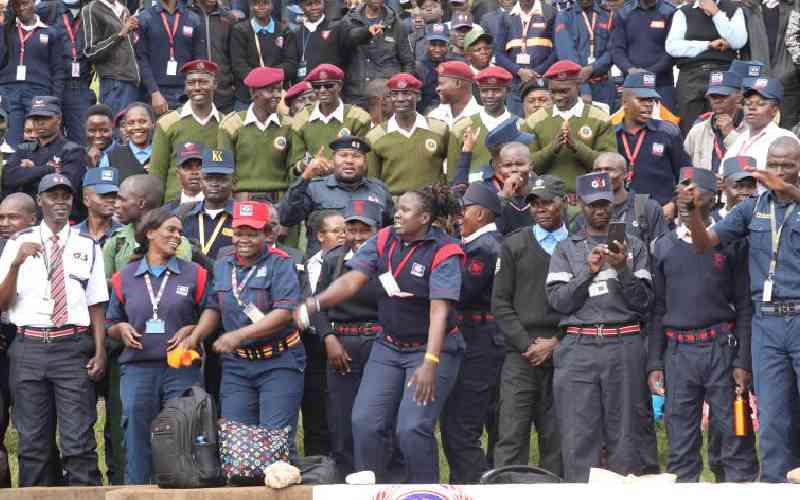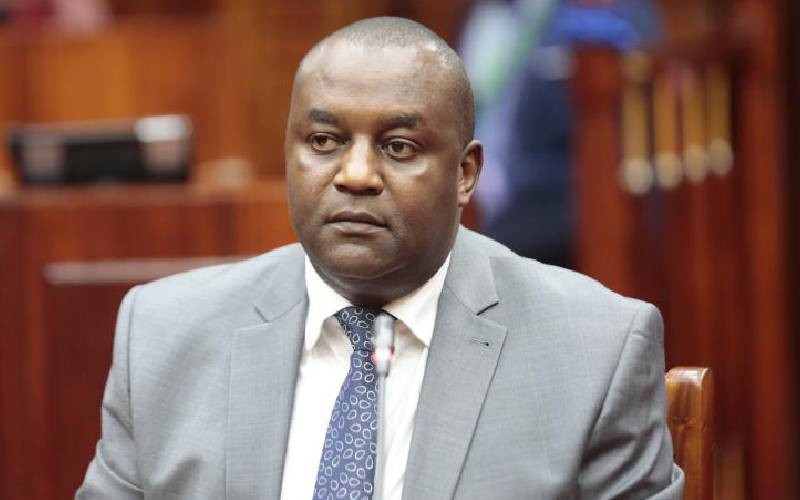BY KENNEDY ODEDE
Tell us a little about your childhood?
I am the first born in a family of eight, five boys and three girls. I grew up in Kibera under tough conditions. My dad had no job while my mother sold mbogas by the roadside. Life was so hard that at age ten, I ran away from home and became a chokora (street kid).
What was it like living on the streets?
Living in the streets was tough. Every street group had a leader, and to join you had to be initiated. Initiation involved being sent to steal or getting beaten up, and if you held your ground, then you were in. We stole for a living and drowned our sorrows by sniffing glue. Glue also helped to keep us warm when it was cold. This life toughened me up. I stayed on the street for two years.
How did you get out of the street life?
Life on the streets is addictive because of the freedom that comes with it. We would do what we wanted whenever we wanted, so leaving was hard. It was one white priest from St Michael’s Church in Lang’ata who convinced me to give up street life.
He was so persistent and would always invite my friends and I to church. We liked him because he was so kind and always heeded to his calls. He would teach us about the Bible, give us hot meals and pray for us.
He connected me with Missionaries of Charity who convinced me to go back home.
Was it difficult settling back into the society?
Yes it was. My mum accepted me with open arms, but some of my family members treated me like the prodigal son.
My street friends were not happy with my return home and some used all antics to bully me back. But I had made up my mind. They eventually left me alone.
Did you go back to school?
Yes I did. My mum always encouraged me to complete my studies. So I went to Kisumu Ndogo Primary School. In order to buy books and stationery, I started selling ground nuts by the roadside. When I got to Class Eight, my parents moved me to upcountry so I sat for my exams in Gagra Primary School. After KCPE in 1998, I returned to Nairobi to live with my parents. But unfortunately, they could not raise my school fees for high school.
Stay informed. Subscribe to our newsletter
What did you do next?
Because I did not want to stay idle, I started going to Christ The King Catholic Church in Kibera to pass time. I offered to sweep the compound for free.
While working at the church, I met an American called Alex who was in Kibera to do research. I offered to show him around the slum if he gave me food every day. With time, we became good friends and I shared my story with him. He was so touched. Before he returned to America, he gave me books by Martin Luther King and Nelson Mandela.
Was that the turning point in your life?
After reading those two books, my hope was renewed. I had lost all hope after completing primary school and having nothing to do. Around that time, a friend had committed suicide at home and left a note that read, “I cannot live this life anymore”.
A close friend also died of HIV, and two of my sisters got pregnant at age 15, the same age my mother got married.
It felt like I was stuck in a rut, like I was going round in circles. I realised that these two great men had overcome debilitating poverty like me to become global icons. I wanted to be a global voice of change like them.
That is what inspired me to start Shinning Hope for Communities (Shofco).
Tell us more about Shofco?
When I started it, I had no money but hope — I wanted to share that. So I started a forum where people who had lost hope could come and meet, talk and encourage each other. We would talk about issues affecting our community and look for solutions. We were also involved, in sports, theatre and would also do clean ups within Kibera.
Shofco has grown into an influential group in Kibera. Tell us about the journey.
We started collecting money to fund businesses for members. We even began making bracelets and selling them at Maasai Market. Within no time, it became a powerful movement of hope in Kibera.
We had a dream and we were unstoppable. Around that time, the World Social Forum was going on in Nairobi and we got to perform. My wife Jessica Posner was in that audience.
She saw us perform and was so moved, she promised to do something once she was in the USA.
How did she open a door for you?
She sent me an email and told me she wanted to come and do a research in Kibera, and wanted to come and stay with my family. What? I thought she was crazy. We did not even have a toilet and had to use flying toilets!
I told her all these realities but she was persistent. So she came over and stayed with my family for eight months and helped us with theatre.
What happened during these eight months?
She became a part of the community and we became very close. She offered to pay my high school fees at Dn. Handa High School in Naivasha. As I took up my studies, I left Shofco in the hands of a close friend. When I completed high school, Jessica helped me apply for universities in the US where I could get scholarships. I got a chance at Weslegan University where I did a degree in Sociology and Government.
How was it like coming from Kibera and now living in the US?
It was a huge culture shock. Everything was new and fascinating for me. From the sky scrappers to the sophisticated transport system, I was awe-stricken. But thanks to Jessica and her family, I was able to settle and adapt to the new life.
What made you come back home?
I wanted to bring some change back home and continue managing Shofco. We came back to Kenya with Jessica in 2009. Of course, I was now a changed man, and could afford to stay in a good hotel, but Jessica and I chose to live among the people in Kibera.
After settling down, we built a school for young kids who had dropped out due to teen pregnancies.
We hired teachers and also a counsellor for the girls because many of them had suffered sexual abuse and neglect, and we felt they needed an environment to heal.
The community was very helpful and parents volunteered their time and resources at the school.
We started a sukuma garden, and also began selling water as income generating activities.
So how did you grow to be at the level you are at?
With time, people began to hear about the school and donations started flowing in. Paul Newsman Foundation donated money for a bio latrine, the Clinton Global Initiative gave money, which we used to build a clinic in Kibera that serves 20,000 people for free. Now our school, which is situated at the heart of Kibera, not only provides free education for teen girls, but also provides food and clean water for the community. We also have an empowerment project for women who have suffered gender-based violence.
Looks like there was something brewing between you and Jessica all along?
Yes. From the day I saw her, I was smitten but I kept my feeling to myself because I did not want to scare her off. She also had feelings for me and at the opportune time, I declared my love to her. But I must say fate connected us so well, we were meant to be together. Jessica and I got married last year in Denver Colorado after having a pre-wedding here in Kenya. We have no baby yet. In our free time we love to travel and do yoga.
 The Standard Group Plc is a
multi-media organization with investments in media platforms spanning newspaper
print operations, television, radio broadcasting, digital and online services. The
Standard Group is recognized as a leading multi-media house in Kenya with a key
influence in matters of national and international interest.
The Standard Group Plc is a
multi-media organization with investments in media platforms spanning newspaper
print operations, television, radio broadcasting, digital and online services. The
Standard Group is recognized as a leading multi-media house in Kenya with a key
influence in matters of national and international interest.
 The Standard Group Plc is a
multi-media organization with investments in media platforms spanning newspaper
print operations, television, radio broadcasting, digital and online services. The
Standard Group is recognized as a leading multi-media house in Kenya with a key
influence in matters of national and international interest.
The Standard Group Plc is a
multi-media organization with investments in media platforms spanning newspaper
print operations, television, radio broadcasting, digital and online services. The
Standard Group is recognized as a leading multi-media house in Kenya with a key
influence in matters of national and international interest.





